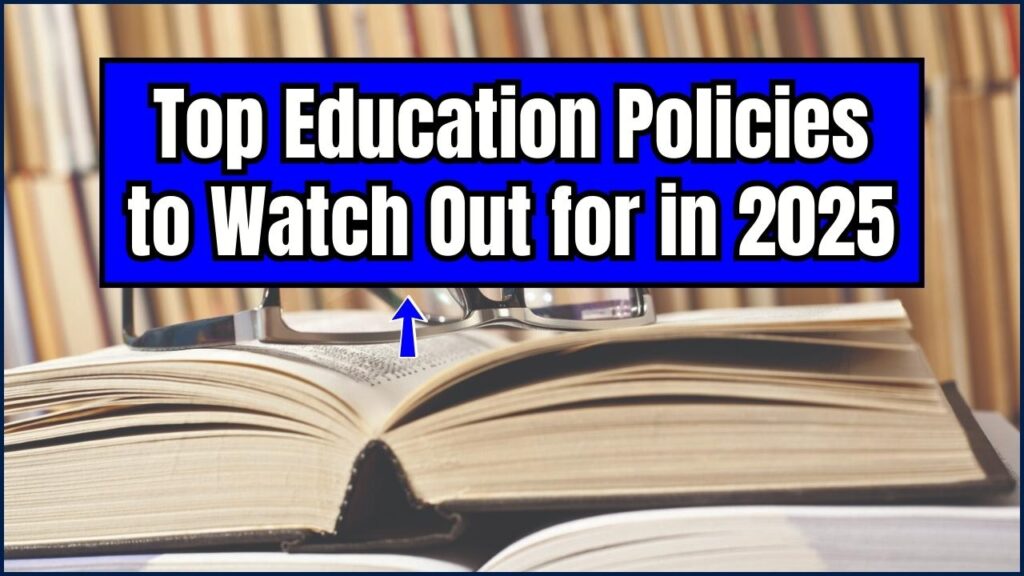Top Education Policies to Watch Out for in 2025: Education in 2025 ain’t what it used to be, folks. The landscape is shifting faster than a TikTok trend, and whether you’re a parent, teacher, student, or policymaker, you need to keep your radar tuned in. The top education policies to watch out for in 2025 aren’t just buzzwords pulled from bureaucratic files—they’re the real drivers shaping how we teach, learn, and grow across the U.S., India, and much of the world.

From an intense shift toward skills over scores, to inclusivity in language and pedagogy, to using AI and ed-tech to close learning gaps, 2025 is the year policymakers are finally walking the talk. Whether it’s regulating private coaching centers or making sure rural kids get access to the same resources as urban students, this year is making bold promises—and starting to deliver.
Top Education Policies to Watch Out for in 2025
| Topic | Details |
|---|---|
| National Education Policy | NEP 2025 introduces skill-based, multilingual, child-centric learning |
| State Reforms | Delhi, Rajasthan, Jharkhand rolling out fee regulation & regional languages |
| Tech in Classrooms | DIKSHA expansion, academic records digitization (NAD), AI dashboards |
| Higher Ed Changes | Skilling ITIs, IIT expansion, debates on arts/science college entrance tests |
| Health Initiatives | CBSE mandates ‘sugar boards’ for student nutrition awareness |
| Emotional Safety | Emphasis on mental health policies in schools via state-level mandates |
| Official Site | Ministry of Education |
2025 isn’t just another year for education—it’s a big, bold pivot. From classroom reforms to AI-backed grading, from coaching center crackdowns to tribal-language teaching, there’s change at every level.
It’s no longer about just surviving exams—it’s about thriving through learning that matters. If you’re a parent, teacher, or student, the best thing you can do? Stay updated, stay vocal, and demand better. Because these policies won’t work in isolation—they need you, too.
Bookmark DIKSHA. Talk to your local school boards. Be part of the movement.
National Education Policy 2025: Rewriting the Playbook
Let’s kick things off with NEP 2025. This policy is a bolder, more modern evolution of India’s 2020 version. Gone is the cookie-cutter 10+2 structure. Say hello to the 5+3+3+4 system, which syncs school stages with a child’s mental and emotional development—think preschoolers getting actual foundational literacy instead of mindless cramming.
A major highlight? Skill-based learning. By the time a student hits Grade 6, they’ll be knee-deep in real-life skills like carpentry, AI basics, digital finance, or coding. We’re talking actual job-ready experience before they even step foot in college.
NEP 2025 also leans hard into regional and mother-tongue instruction—a tribal kid in Jharkhand learning math in Santhali isn’t just getting better comprehension, they’re staying in school longer and learning with pride. It’s a shift toward equity, not just access.
The policy also opens doors to flexible academic tracks, meaning a kid who loves math but also enjoys painting can now mix both without judgment or restriction. Hybrid learning paths are encouraged, helping break the outdated mold of “science or arts.”
CBSE 2025 Exam & Revaluation Updates
CBSE, India’s top school board, is finally embracing transparency. The revaluation process now requires students to first get photocopies of their evaluated answer sheets. This allows them to see their marks and decide if a recheck is worth it—goodbye guesswork.
Supplementary exams also got a much-needed reboot. Now:
- Class 10 students can retake exams in all subjects if they need a boost.
- Class 12 students can choose one subject to redo and raise their score.
This is more than a paperwork tweak—it’s a chance for redemption. Kids no longer have to carry one poor result like a scarlet letter. It’s about second chances, not shaming.
Plus, there’s talk of AI-assisted grading coming to CBSE by the end of 2025. That means faster, less biased marking, and fewer cases of inconsistent results across regions.
State-Level Shakeups: Delhi, Rajasthan, Jharkhand, and Beyond
Reforms hit hardest at the state level. Let’s take a quick tour of what some states are doing right now.
Delhi: Putting the Brakes on Fee Hikes
Private schools in Delhi have had free rein on tuition hikes for too long. Now, with the Delhi School Education Fee Regulation Bill, schools can’t raise fees without official nods. If they do? That’s a ₹50,000 fine per student.
The bill also demands greater financial transparency—schools must share their balance sheets, justify infrastructure spends, and publish salaries paid to teachers. Parents finally get a say.
Rajasthan: Coaching Centers Under Watch
Too many suicides in coaching hubs like Kota have spurred the Coaching Centre Regulation Act 2025. Every coaching institute must register, disclose success rates, limit student intake, and provide mental health counseling.
The new law also bans:
- Ads promising unrealistic selection rates
- 18-hour study shifts
- Weekly student performance shaming
That’s a lifeline for kids drowning in pressure.
Jharkhand: Tribal Pride and Multilingual Classrooms
Jharkhand is pioneering mother-tongue learning by introducing tribal languages like Mundari, Santhali, Ho, and Kurukh into government schools. This boosts:
- Student retention
- Learning comprehension
- Cultural preservation
And let’s not forget: it builds confidence. For the first time, tribal kids are being taught in the language they think and dream in.
Education Meets Technology: DIKSHA, NAD, and AI Dashboards
DIKSHA, the national digital learning platform, is leveling up in 2025:
- Content in 36 Indian and 7 foreign languages
- Teacher training through gamified apps
- Integration with AI dashboards to track student learning in real time
Meanwhile, National Academic Depository (NAD) is turning academic records into tamper-proof digital certificates. This means:
- Instant verification during college admissions
- No risk of lost mark sheets
- A single access point for lifetime academic history
Expect cloud-based transcript delivery and even blockchain integration by late 2025.
Higher Education: IIT Expansion, ITI Upgrades, and the Great Entrance Debate
Let’s talk about the college front. Big things are brewing:
- More IITs and IIITs are being set up in smaller towns to decentralize elite education.
- Industrial Training Institutes (ITIs) are adding courses in AI, robotics, climate tech, and entrepreneurship.
But here’s the controversial bit: the central government wants standardized entrance exams for arts and science colleges.
Critics say it’ll hurt marginalized students who excel under open-access models. Tamil Nadu, for example, boasts a high college enrollment rate thanks to its inclusive, exam-free approach—and it’s not going down without a fight.
Health and Happiness in Schools: CBSE’s Sugar Boards & More
CBSE isn’t just about marks anymore. With child diabetes rates rising, the board is asking every school to set up Sugar Boards to:
- Teach students the risks of excess sugar
- Run healthy food workshops
- Replace junk snacks in canteens with fresh, affordable options
Some schools are going even further:
- Introducing weekly yoga & meditation sessions
- Launching mental health helplines
- Running “no-phone” campus days to cut screen time
That’s right—education is becoming about the whole child, not just test scores.
Government Jobs 2025: Over 92,000 Vacancies Out Now – Find the Best One for You Today
FAQs About Top Education Policies to Watch Out for in 2025
Q1: What is NEP 2025’s biggest innovation?
A: The 5+3+3+4 structure and hybrid learning pathways that allow personalized skill development.
Q2: Will entrance exams be the norm across all colleges?
A: The central government is pushing for it, but states like Tamil Nadu are resisting to maintain equity.
Q3: Are CBSE re-checks easier now?
A: Yes. Students first get a copy of their answer sheet before deciding to apply for revaluation.
Q4: What are Sugar Boards and why do they matter?
A: They teach kids about sugar, diabetes, and healthy food choices to promote long-term wellness.
Q5: How does the NAD system help students?
A: It stores academic records digitally for secure, fast access to degrees and certificates.
Q6: What about mental health in schools?
A: Some states have started mandating in-school counselors and wellness periods to address rising stress.











